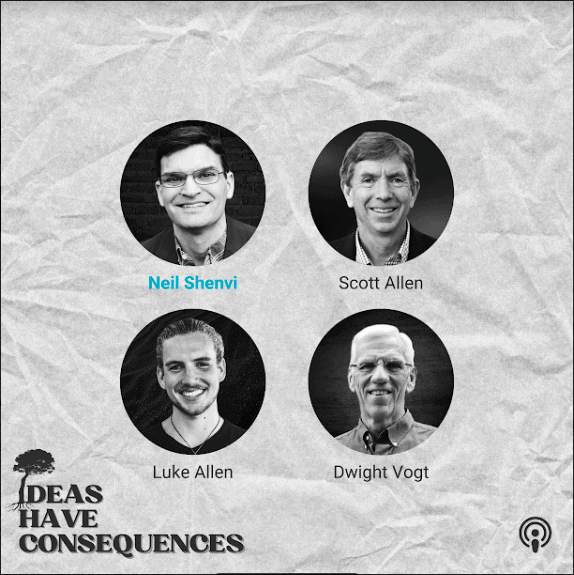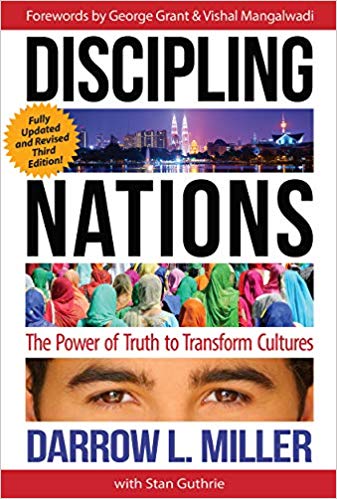At a Glance
Dr. Neil Shenvi is one of the leading critics of critical theory, speaking and writing about it for over seven years. During this time, we have seen the debate spread from the halls of academia to the dinner table. Today CRT and wokeism are widely understood, and the dividing lines between advocates and antagonists have been drawn–but the question looms, where do we go from here?
In this episode, we focus our discussion around the question of, what now? How can we, as Christians, not just point out a false worldview, but offer a better one? What is the better worldview, and what will boldly applying it look like?
What You'll Hear
- Introduction (1:21)
- Where’s the debate today surrounding CRT? (6:25)
- Now that we understand CRT and wokism, where do we go from here? (11:04)
- The most destructive elements of CRT (15:09)
- Why is Neil Shenvi criticized by both sides of the debate? (27:30)
- Why you can’t just criticize a bad worldview, you have to offer a better one (31:22)
- What is a better worldview than critical theories? (35:24)
- Discussing the theological “Third Way” trend (44:22)
- Conclusion (56:02)
Special Guest Dr. Neil Shenvi has an AB in chemistry from Princeton and a PhD in theoretical chemistry from UC Berkeley. He is the author of Why Believe?: A Reasoned Approach to Christianity and is widely recognized for his writing on critical theory, which can be found in journals like Eikon and The Journal of Christian Legal Thought. He is married and has four children.
Using the link above, you can read the transcript, listen along, and adjust the speed of the podcast while you listen.
It's not always helpful to downplay the offensive parts of the gospel and play up people's felt needs, because sometimes their felt needs are for things that are actually bad for them.
Dr. Neil Shenvi (51:28)

Go Deeper
- New book by Neil Shenvi available for pre-order: Critical Dilemma: The Rise of Critical Theories and Social Justice Ideology―Implications for the Church and Society
- Neil Shenvi’s Website (shenviapologetics.com) – Christian apologetics from a homeschooling theoretical chemist
- Neil Shenvi (@NeilShenvi) on Twitter
- Book and Study Guide from DNA: Why Social Justice Is Not Biblical Justice: An Urgent Appeal to Fellow Christians in a Time of Social Crisis by Scott David Allen
The Kingdomizer Training Course
A Kingdomizer advances the truth, goodness, and beauty of God’s Kingdom in the world in which they live. The Kingdomizer Training Program is a series of online courses designed to equip you to live out Christ’s truth and redemptive love in transforming ways.
The Kingdomizer Training Program teaches you a true, Biblical Worldview and how to use that worldview to impact others.
Root To Fruit
Root-to-Fruit’s mission is based on a conviction that God’s truth has the power to transform individuals, organizations, communities and even nations. Organizations are transformed when its leaders and staff confront cultural lies, and instead embody and proclaim God’s biblical truths. Helping organizations to do this is the beating heart of our mission. Understanding a biblical worldview creates space for people to assess their own worldview in contrast to God’s truth. A biblical worldview begins with two foundational assumptions:
- Jesus is King over all, and
- His Word is truth.
When an organization disciples a culture built on a foundation of these twin truths, its leaders and staff begin to work in harmony, with a common language to flourish.
A biblically empowered worldview reconciles broken relationships with God, self, others and the environment. Out of a renewed sense of identity in God’s image, the leaders and staff improve their spiritual and physical livelihoods through individual responsibility, trust, respect and hard work. Leaders and staff together begin to define the desired transformation, own it and are accountable for the outcome.
Discipling Nations: The Power of Truth to Transform Cultures
Have Christians underestimated the power of God’s truth to transform entire societies? In Discipling Nations, Darrow Miller builds a powerful and convincing thesis that God’s truth not only breaks the spiritual bonds of sin and death but can free whole societies from deception and poverty. Completely revised and updated for the third edition, Discipling Nations will challenge, reenergize, and equip Christians everywhere who labor to see His kingdom come, His will be done.Quotes
And clearly, Christianity is a better worldview—it offers so much more in terms of hope for redemption, and reconciliation and forgiveness. And this better view of what it means to be a human being and just you name it, it just results in so much, that’s very positive. Scott (31:44)
But then this is where I got the pushback, which was, you know, we shouldn’t really be engaged in culture and society, really, you know, we should be kind of trying to win souls out of society. And, you know, any kind of engagement in society is kind of a distraction. And I thought, oh, that’s part of the reason we’re in this problem (with CRT) right now in the first place. Scott (32:14)
This idea of a withdrawal from culture … to where?! You’re gonna send your kids to school, or to college, or even to work or to anywhere—you can’t escape the culture! And then your kids come back with these crazy ideas—well, because you abandoned the public square. Neil (32:39)
Some set of ideas are always going to be at the foundation of a society, right? If you keep drilling down, there’s always going to be policies and principles, but below that, there’s always ideas, and belief systems, faith, religion. And if it’s not the biblical one, it’s going to be something else. And if it’s not the biblical one, it’s going to be destructive, almost inevitably. Not that there’s never any truth to it, but it’s largely going to be destructive. So as Christians, we shouldn’t be apologetic at all. We have something. It’s about blessing nations. It’s about doing our mission, frankly. Scott (33:31)
I realized that I, as an atheist, could not explain why racism was bad. And I began to realize that you, as a Christian, hated racism, and you had a reason to hate racism, whereas I just had this kind of intuitive, emotive idea. Neil (39:14)
It’s not always helpful to basically downplay the offensive parts of the gospel or Christianity and play up the positive elements and people’s felt needs, because sometimes their felt needs are for the things that are actually bad for them. Neil (51:28)
Some people are actually hurting from their sin. They’re miserable. They need to hear the gospel—that you can be forgiven from this; they already hate themselves. So they need to be told the good news, but other people who are hard in their sin need to be told the bad news, you need to be broken by God’s law, so that you can be bound up by the gospel. My point is that one size does not fit all. And I think you can tend to just say, this is the way to share the gospel, this is the way to preach the gospel. And this “third way” approach, I think it’s become less and less useful, as our culture is more and more opposed not to their false ideas [misunderstandings] about Christianity … They’re opposed to what Christianity actually teaches. Neil (53:18)





